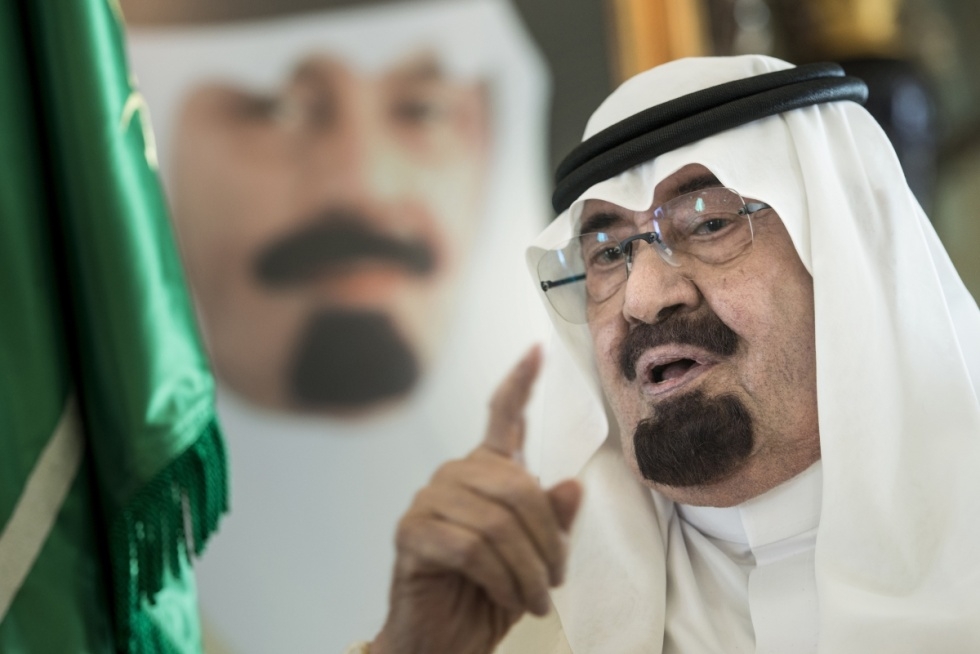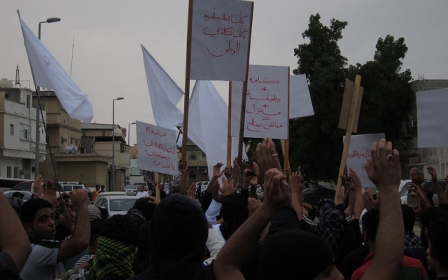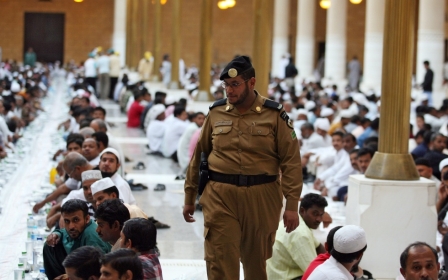Saudi king vows not to allow ISIL to 'terrify Muslims'

King Abdullah of Saudi Arabia on Sunday criticised religious extremists, vowing not to let “a handful of terrorists…terrify Muslims”, in a speech to mark the start of the holy fasting month of Ramadan.
Islam is a “religion of unity, fraternity and mutual support” but some people “lured in by false calls…are confusing reform with terrorism”, he said in comments published by state news agency SPA.
“Their goal is to sow discord among Muslims,” he added, in an apparent reference to the Islamic State of Iraq and the Levant (ISIL).
ISIL, fighting alongside other armed Sunni groups, has taken over large swathes of Iraq in the past two weeks and continues to wage battles against government forces in an effort to consolidate power in a country racked by deeply entrenched community divisions. The group is seeking to establish a contiguous Islamic state traversing national borders that would include Saudi Arabia, whose leaders now perceive a threat to be on their doorstep.
“We will not allow a handful of terrorists, using Islam for personal aims, to terrify Muslims or undermine our country and its inhabitants,” Abdullah said. “We are continuing, with God’s help, to face and tackle this scourge.”
Saudi Arabia, however, has been accused itself of supporting ISIL and financing Sunni insurgency groups across the region. A diplomatic cable in December 2009 from US Secretary of State Hillary Clinton to US Embassies around the world, published by WikiLeaks, said “donors in Saudi Arabia constitute the most significant source of funding to Sunni terrorist groups worldwide”.
On 23 June a Qatari official was quoted in The Atlantic as saying “ISIL has been a Saudi Project”, pointing to former intelligence chief Prince Bandar bin Sultan as being the driving force behind the group’s rise in Syria.
“ISIL…may have been a major part of Bandar’s covert-ops strategy in Syria,” said The Atlantic report. “The Saudi government, for its part, has denied allegations, including claims made by Iraqi Prime Minister Nouri al-Maliki that it has directly supported ISIL,” it added.
Prince Bandar unsuccessfully led Saudi Arabia’s attempts to remove Syrian President Bashar al-Assad from power, which resulted in his sacking from the intelligence brief in February this year. Many viewed his firing as indicating an end to his influence at the very top in Saudi Arabia, an impression that has been compounded by his son being dismissed as deputy defence minister yesterday.
Prince Khaled bin Bandar bin Abdul Aziz was removed by royal decree just six weeks after being appointed, with the decision taken by Crown Prince Salman bin Abdul Aziz, according to SPA. The reasons for the move have not been revealed and no successor has been announced for Prince Khaled.
Secretive moves within the royal family leave much to rumour. While Prince Bandar is now widely seen as being beyond the King’s inner circle, when King Abdullah met with new Egyptian President Abdel Fattah al-Sisi last week, the prince was pictured attending the meeting.
Ultimately, confusion reigns in the absence of publicly available information on the inner workings of the Saudi royal family and it remains unclear what role Prince Bandar now plays in the Gulf State and how much substance there is to allegations of financial backing from donors within the kingdom.
Spying on domestic dissidents
Domestic dissent in Saudi Arabia, however, is far more clearly understood and the government continues to have little tolerance for any activities that may challenge its stranglehold on power.
Human Rights Watch (HRW) on Friday said that authorities may have used surveillance software made by Italian firm Hacking Team to target individuals from the restive Qatif district in Eastern Province, where there have been sporadic Shiite-led protests since February 2011.
"We have documented how Saudi authorities routinely crack down on online activists who have embraced social media to call out human rights abuses," said Cynthia Wong, HRW's Senior Internet researcher. "It seems that authorities may now be hacking into mobile phones, turning digital tools into just another way for the government to intimidate and silence independent voices," she added.
HRW said security researchers at the Toronto-based Citizen Lab have identified a malicious, altered version of an application providing mobile access to news related to Qatif, which if installed on a mobile phone infects it with spyware made by Hacking Team, a company that only sells to governments.
The spyware allows a government to see a phone's call history, text messages, contacts and emails and files from social media, HRW said, adding that the software can turn on a phone’s camera or microphone to take pictures or record conversations without the owner’s knowledge.
Protests in Qatif have taken place for many years, although they have stepped up since the beginning of the Arab Spring uprisings in 2011 and often led to violent clashes with security forces. The Shia community, who make up 10 to 15 percent of the country’s 28 million population, have long since complained of having their rights abused by the government.
If authorities in the kingdom are targeting activists' mobiles with spyware, "it could indicate a ratcheting up of efforts to scrutinise online activism in an environment that is already hostile to the freedoms of expression and association," HRW said.
HRW said Citizen Lab could not confirm "whether Saudi Arabia or any other government has successfully deployed Hacking Team tools in Saudi Arabia, nor who may have been specifically targeted."
"However, given that the spyware is embedded in a doctored version of an existing application, potential targets are likely to have an interest in current affairs related to the Qatif governorate," HRW said, adding Hacking Team-linked servers have been found by Citizen Labs to be present in the kingdom.
Government officials have not commented on the Human Rights Watch statement.
Middle East Eye propose une couverture et une analyse indépendantes et incomparables du Moyen-Orient, de l’Afrique du Nord et d’autres régions du monde. Pour en savoir plus sur la reprise de ce contenu et les frais qui s’appliquent, veuillez remplir ce formulaire [en anglais]. Pour en savoir plus sur MEE, cliquez ici [en anglais].




